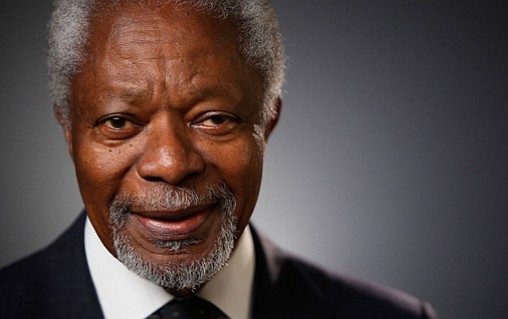Nobel winner Kofi Annan, the first black African to lead the United Nations, dies at 80
Reuters | 8/23/2018, 6 a.m.
Former U.N. Secretary-General and Nobel Peace Prize laureate Kofi Annan died on Saturday, Aug. 18, 2018, his foundation said, after decades of championing efforts to try to end protracted conflicts in Africa, Asia and the Middle East.
Mr. Annan was 80 and the first black African to lead the United Nations.
A Ghanaian national, he died in a hospital in Bern, Switzerland, in the early hours, his close associates said.
In Geneva, the Kofi Annan Foundation announced his peaceful death after a short undisclosed illness with “immense sadness,” saying he was surrounded in his last days by his second wife, Nane, and his children, Ama, Kojo and Nina.
After rising through the ranks of the United Nations, Mr. Annan served two terms as U.N. secretary-general in New York from 1997 to 2006 and retired to live in a Swiss village in the Geneva countryside. His 10-year-old foundation promotes good governance and the transformation of African agriculture.
“In many ways, Kofi Annan was the United Nations. He rose through the ranks to lead the organization into the new millennium with matchless dignity and determination,” U.N. Secretary-General Antonio Guterres, whom Mr. Annan had chosen to head the U.N. refugee agency, said in a statement.
Mr. Annan and the United Nations shared the 2001 Nobel Peace Prize for efforts to reform the world body and give priority to human rights issues.
As head of U.N. peacekeeping operations, Mr. Annan was criticized for the world body’s failure to halt the genocide in Rwanda in the 1990s.
As U.N. boss, he was linked to peace efforts to reunite the divided island of Cyprus, submitting a reunification blueprint which was rejected in a referendum by Greek Cypriots in 2004.
He staunchly opposed the U.S.-led invasion of Iraq in 2003 and later served as the first U.N. envoy at the start of Syria’s war, but quit after world powers failed to fulfill their commitments, saying, “I lost my troops on the way to Damascus.”
“The U.N. can be improved. It is not perfect, but if it didn’t exist, you would have to create it,” he told the BBC’s Hard Talk during an interview for his 80th birthday in April, recorded at the Geneva Graduate Institute where he had studied.
“I am a stubborn optimist, I was born an optimist and will remain an optimist,” added Mr. Annan, who often joked about having learned from locals to wear earmuffs against the freezing cold during his undergraduate years at Macalester College in St. Paul, Minn., in the United States.
Raila Odinga, Kenyan opposition leader and former prime minister, said on Citizen TV: “We didn’t expect Kofi to pass that abruptly. Kofi Annan is a man of integrity; a great African, a great leader of the world.”
Mr. Annan was praised by officials from the United States.
Former President Obama described him as “a diplomat and humanitarian who embodied the mission of the United Nations like few others,” while former President George W. Bush called him “a gentle man and a tireless leader.”
U.S. Ambassador to the United Nations Nikki Haley said, “Kofi Annan devoted his life to making the world a more peaceful place through his compassion and dedication to service. He worked tirelessly to unite us and never stopped fighting for the dignity of every person.”
U.N. High Commissioner for Human Rights Zeid Ra’ad al-Hussein paid tribute to Mr. Annan as “humanity’s best example, the epitome, of human decency and grace.”
Mr. Zeid, who has criticized major powers and other countries during his four-year term that ends later this month, said that whenever he felt “isolated and alone politically,” he would go for long walks with Mr. Annan in Geneva.
“When I told him once how everyone was grumbling about me, he looked at me — like a father would look at a son — and said sternly, ‘You’re doing the right thing, let them grumble.’ Then he grinned!”






